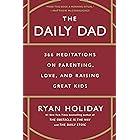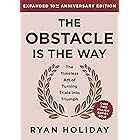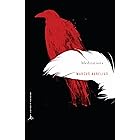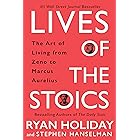| 纸书定价: | US$29.00 |
| Kindle电子书价格: | US$16.99 节省 US$12.01 (41%) |
| 卖家: | Penguin Group (USA) LLC 此价格由发行人制定. |
您的会员资格和订阅

下载免费的 Kindle 阅读软件,即可立即在智能手机、平板电脑或电脑上阅读 Kindle 电子书 - 无需 Kindle 设备。
使用 Kindle 网页版即时在浏览器上阅读。
使用手机摄像头 - 扫描以下代码并下载 Kindle 阅读软件。



 Audible 示例
Audible 示例 The Daily Stoic: 366 Meditations on Wisdom, Perseverance, and the Art of Living Kindle电子书
Why have history's greatest minds—from George Washington to Frederick the Great to Ralph Waldo Emerson, along with today's top performers from Super Bowl-winning football coaches to CEOs and celebrities—embraced the wisdom of the ancient Stoics? Because they realize that the most valuable wisdom is timeless and that philosophy is for living a better life, not a classroom exercise.
The Daily Stoic offers 366 days of Stoic insights and exercises, featuring all-new translations from the Emperor Marcus Aurelius, the playwright Seneca, or slave-turned-philosopher Epictetus, as well as lesser-known luminaries like Zeno, Cleanthes, and Musonius Rufus. Every day of the year you'll find one of their pithy, powerful quotations, as well as historical anecdotes, provocative commentary, and a helpful glossary of Greek terms.
By following these teachings over the course of a year (and, indeed, for years to come) you'll find the serenity, self-knowledge, and resilience you need to live well.
购买此商品的顾客也同时购买
 Control your perceptions. Direct your actions properly. Willingly accept what’s outside your control.22,801 位 Kindle 读者已标注
Control your perceptions. Direct your actions properly. Willingly accept what’s outside your control.22,801 位 Kindle 读者已标注 If we can focus on making clear what parts of our day are within our control and what parts are not, we will not only be happier, we will have a distinct advantage over other people who fail to realize they are fighting an unwinnable battle.13,915 位 Kindle 读者已标注
If we can focus on making clear what parts of our day are within our control and what parts are not, we will not only be happier, we will have a distinct advantage over other people who fail to realize they are fighting an unwinnable battle.13,915 位 Kindle 读者已标注 The single most important practice in Stoic philosophy is differentiating between what we can change and what we can’t.11,932 位 Kindle 读者已标注
The single most important practice in Stoic philosophy is differentiating between what we can change and what we can’t.11,932 位 Kindle 读者已标注 Have you taken the time to get clarity about who you are and what you stand for? Or are you too busy chasing unimportant things, mimicking the wrong influences, and following disappointing or unfulfilling or nonexistent paths?11,932 位 Kindle 读者已标注
Have you taken the time to get clarity about who you are and what you stand for? Or are you too busy chasing unimportant things, mimicking the wrong influences, and following disappointing or unfulfilling or nonexistent paths?11,932 位 Kindle 读者已标注 According to the Stoics, the circle of control contains just one thing: YOUR MIND.9,852 位 Kindle 读者已标注
According to the Stoics, the circle of control contains just one thing: YOUR MIND.9,852 位 Kindle 读者已标注
编辑评论
媒体推荐
—The Wall Street Journal
"Whether you're a lowly cubicle slave or a US Senator, this book will help you find your still center."
—Gregory Hays, translator of The Modern Library's edition of Marcus Aurelius' Meditations
"A generous gift of guidance on modern living culled from a canon of wisdom hatched long ago."
—Maria Popova, editor of Brain Pickings
"A richly rewarding spring of practical wisdom to help you focus on what's in your control, eliminate false and limiting beliefs, and take more effective action. Make The Daily Stoic your guide and you will grow in clarity, effectiveness, and serenity each day!"
—Jack Canfield, co-author of The Success Principles™ and the Chicken Soup for the Soul® series
"The Daily Stoic is a treasure for managing our choices, overcoming self-deception, and learning to act according to the true worth of things while keeping the common good always in view. Caring for the soul in this way makes not only better people, but a stronger society too."
—Joseph A. Maciariello, Professor Emeritus at The Peter F. Drucker and Masatoshi Ito Graduate School of Management; author of The Daily Drucker, The Effective Executive in Action, and A Year with Peter Drucker
"The Daily Stoic offers all who seek a calm, wise life a daily spiritual anchor. This book will keep you strong across dark times and steady and clear no matter what your circumstances happen to be. Keep this treasure close and it will care for you.”
—Sharon Lebell, interpreter of The Art of Living by Epictetus
作者简介
Stephen Hanselman has worked for more than three decades in publishing as a bookseller, publisher and literary agent. He is a graduate of Harvard Divinity School, where he received a master's degree while also studying extensively in Harvard's philosophy department. He lives with his family in South Orange, New Jersey.
文摘
"The chief task in life is simply this: to identify and separate matters so that I can say clearly to myself which are externals not under my control, and which have to do with the choices I actually control. Where then do I look for good and evil? Not to uncontrollable externals, but within myself to the choices that are my own . . ."
-Epictetus, Discourses, 2.5.4-5
The single most important practice in Stoic philosophy is differentiating between what we can change and what we can't. What we have influence over and what we do not. A flight is delayed because of weather-no amount of yelling at an airline representative will end a storm. No amount of wishing will make you taller or shorter or born in a different country. No matter how hard you try, you can't make someone like you. And on top of that, time spent hurling yourself at these immovable objects is time not spent on the things we can change.
The recovery community practices something called the Serenity Prayer: "God, grant me the serenity to accept the things I cannot change, the courage to change the things I can, and the wisdom to know the difference." Addicts cannot change the abuse suffered in childhood. They cannot undo the choices they have made or the hurt they have caused. But they can change the future-through the power they have in the present moment. As Epictetus said, they can control the choices they make right now.
The same is true for us today. If we can focus on making clear what parts of our day are within our control and what parts are not, we will not only be happier, we will have a distinct advantage over other people who fail to realize they are fighting an unwinnable battle.
January 2nd Education Is Freedom
"What is the fruit of these teachings? Only the most beautiful and proper harvest of the truly educated-tranquility, fearlessness, and freedom. We should not trust the masses who say only the free can be educated, but rather the lovers of wisdom who say that only the educated are free."
-Epictetus, Discourses, 2.1.21-23a
Why did you pick up this book? Why pick up any book? Not to seem smarter, not to pass time on the plane, not to hear what you want to hear-there are plenty of easier choices than reading.
No, you picked up this book because you are learning how to live. Because you want to be freer, fear less, and achieve a state of peace. Education-reading and meditating on the wisdom of great minds-is not to be done for its own sake. It has a purpose.
Remember that imperative on the days you start to feel distracted, when watching television or having a snack seems like a better use of your time than reading or studying philosophy. Knowledge-self-knowledge in particular-is freedom.
January 3rd Be Ruthless to the Things That Don't Matter
"How many have laid waste to your life when you weren't aware of what you were losing, how much was wasted in pointless grief, foolish joy, greedy desire, and social amusements-how little of your own was left to you. You will realize you are dying before your time!"
-Seneca, On the Brevity of Life, 3.3b
One of the hardest things to do in life is to say "No." To invitations, to requests, to obligations, to the stuff that everyone else is doing. Even harder is saying no to certain time-consuming emotions: anger, excitement, distraction, obsession, lust. None of these impulses feels like a big deal by itself, but run amok, they become a commitment like anything else.
If you're not careful, these are precisely the impositions that will overwhelm and consume your life. Do you ever wonder how you can get some of your time back, how you can feel less busy? Start by learning the power of "No!"-as in "No, thank you," and "No, I'm not going to get caught up in that," and "No, I just can't right now." It may hurt some feelings. It may turn people off. It may take some hard work.But the more you say no to the things that don't matter, the more you can say yes to the things that do. This will let you live and enjoy your life-the life that you want.
January 4th The Big Three
"All you need are these: certainty of judgment in the present moment;
action for the common good in the present moment;
and an attitude of gratitude in the present moment for anything that comes your way."
-Marcus Aurelius, Meditations, 9.6
Perception, Action, Will. Those are the three overlapping but critical disciplines of Stoicism (as well as the organization of this book and yearlong journey you've just begun). There's more to the philosophy certainly-and we could spend all day talking about the unique beliefs of the various Stoics: "This is what Heraclitus thought . . ." "Zeno is from Citium, a city in Cyprus, and he believed . . ." But would such facts really help you day to day? What clarity does trivia provide?
Instead, the following little reminder sums up the three most essential parts of Stoic philosophy worth carrying with you every day, into every decision:
Control your perceptions.
Direct your actions properly.
Willingly accept what's outside your control.
That's all we need to do.
January 5th Clarify Your Intentions
"Let all your efforts be directed to something, let it keep that end in view. It's not activity that disturbs people, but false conceptions of things that drive them mad."
-Seneca, On Tranquility of Mind, 12.5
Law 29 of The 48 Laws of Power is: Plan All The Way To The End. Robert Greene writes, "By planning to the end you will not be overwhelmed by circumstances and you will know when to stop. Gently guide fortune and help determine the future by thinking far ahead." The second habit in The 7 Habits of Highly Effective People is: begin with an end in mind.
Having an end in mind is no guarantee that you'll reach it-no Stoic would tolerate that assumption-but not having an end in mind is a guarantee you won't. To the Stoics, oi?sis (false conceptions) are responsible not just for disturbances in the soul but for chaotic and dysfunctional lives and operations. When your efforts are not directed at a cause or a purpose, how will you know what to do day in and day out? How will you know what to say no to and what to say yes to? How will you know when you've had enough, when you've reached your goal, when you've gotten off track, if you've never defined what those things are?
The answer is that you cannot. And so you are driven into failure-or worse, into madness by the oblivion of directionlessness.
January 6th Where, Who, What, and Why
"A person who doesn't know what the universe is, doesn't know where they are. A person who doesn't know their purpose in life doesn't know who they are or what the universe is. A person who doesn't know any one of these things doesn't know why they are here. So what to make of people who seek or avoid the praise of those who have no knowledge of where or who they are?"
-Marcus Aurelius, Meditations, 8.52
The late comedian Mitch Hedberg had a funny story he told in his act. Sitting down for an on-air interview, a radio DJ asked him, "So, who are you?" In that moment, he had to think, Is this guy really deep or did I drive to the wrong station?
How often are we asked a simple question like "Who are you?" or "What do you do?" or "Where are you from?" Considering it a superficial question-if we even consider it at all-we don't bother with more than a superficial answer.
But, gun to their head, most people couldn't give much in the way of a substantive answer. Could you? Have you taken the time to get clarity about who you are and what you stand for? Or are you too busy chasing unimportant things, mimicking the wrong influences, and following disappointing or unfulfilling or nonexistent paths?
January 7th Seven Clear Functions of the Mind
"The proper work of the mind is the exercise of choice, refusal, yearning, repulsion, preparation, purpose, and assent. What then can pollute and clog the mind's proper functioning? Nothing but its own corrupt decisions."
-Epictetus, Discourses, 4.11.6-7
Let's break down each one of those tasks:
Choice-to do and think right
Refusal-of temptation
Yearning-to be better
Repulsion-of negativity, of bad influences, of what isn't true
Preparation-for what lies ahead or whatever may happen
Purpose-our guiding principle and highest priority
Assent-to be free of deception about what's inside and outside our control (and be ready to accept the latter)
This is what the mind is here to do. We must make sure that it does-and see everything else as pollution or a corruption.
January 8th Seeing Our Addictions
"We must give up many things to which we are addicted, considering them to be good. Otherwise, courage will vanish, which should continually test itself. Greatness of soul will be lost, which can't stand out unless it disdains as petty what the mob regards as most desirable.
-Seneca, Moral Letters, 74.12b-13
What we consider to be harmless indulgences can easily become full-blown addictions. We start with coffee in the morning, and soon enough we can't start the day without it. We check our email because it's part of our job, and soon enough we feel the phantom buzz of the phone in our pocket every few seconds. Soon enough, these harmless habits are running our lives.
The little compulsions and drives we have not only chip away at our freedom and sovereignty, they cloud our clarity. We think we're in control-but are we really? As one addict put it, addiction is when we've "lost the freedom to abstain." Let us reclaim that freedom.
What that addiction is for you can vary: Soda? Drugs? Complaining? Gossip? The Internet? Biting your nails? But you must reclaim the ability to abstain because within it is your clarity and self-control.
January 9th What We Control and What We Don't
"Some things are in our control, while others are not. We control our opinion, choice, desire, aversion, and, in a word, everything of our own doing. We don't control our body, property, reputation, position, and, in a word, everything not of our own doing. Even more, the things in our control are by nature free, unhindered, and unobstructed, while those not in our control are weak, slavish, can be hindered, and are not our own."
-Epictetus, Enchiridion, 1.1-2
Today, you won't control the external events that happen. Is that scary? A little, but it's balanced when we see that we can control our opinion about those events. You decide whether they're good or bad, whether they're fair or unfair. You don't control the situation, but you control what you think about it.
See how that works? Every single thing that is outside your control-the outside world, other people, luck, karma, whatever-still presents a corresponding area that is in your control. This alone gives us plenty to manage, plenty of power.
Best of all, an honest understanding of what is within our control provides real clarity about the world: all we have is our own mind. Remember that today when you try to extend your reach outward-that it's much better and more appropriately directed inward.
January 10th If You Want to Be Steady
"The essence of good is a certain kind of reasoned choice; just as the essence of evil is another kind. What about externals, then? They are only the raw material for our reasoned choice, which finds its own good or evil in working with them. How will it find the good? Not by marveling at the material! For if judgments about the material are straight that makes our choices good, but if those judgments are twisted, our choices turn bad."
-Epictetus, Discourses, 1.29.1-3
The Stoics seek steadiness, stability, and tranquility-traits most of us aspire to but seem to experience only fleetingly. How do they accomplish this elusive goal? How does one embody eustatheia (the word Arrian used to describe this teaching of Epictetus)?
Well, it's not luck. It's not by eliminating outside influences or running away to quiet and solitude. Instead, it's about filtering the outside world through the straightener of our judgment. That's what our reason can do-it can take the crooked, confusing, and overwhelming nature of external events and make them orderly.
However, if our judgments are crooked because we don't use reason, then everything that follows will be crooked, and we will lose our ability to steady ourselves in the chaos and rush of life. If you want to be steady, if you want clarity, proper judgment is the best way.
January 11th If You Want to Be Unsteady
"For if a person shifts their caution to their own reasoned choices and the acts of those choices, they will at the same time gain the will to avoid, but if they shift their caution away from their own reasoned choices to things not under their control, seeking to avoid what is controlled by others, they will then be agitated, fearful, and unstable."
-Epictetus, Discourses, 2.1.12
The image of the Zen philosopher is the monk up in the green, quiet hills, or in a beautiful temple on some rocky cliff. The Stoics are the antithesis of this idea. Instead, they are the man in the marketplace, the senator in the Forum, the brave wife waiting for her soldier to return from battle, the sculptor busy in her studio. Still, the Stoic is equally at peace.
Epictetus is reminding you that serenity and stability are results of your choices and judgment, not your environment. If you seek to avoid all disruptions to tranquility-other people, external events, stress-you will never be successful. Your problems will follow you wherever you run and hide. But if you seek to avoid the harmful and disruptive judgments that cause those problems, then you will be stable and steady wherever you happen to be.
January 12th The One Path to Serenity
"Keep this thought at the ready at daybreak, and through the day and night-there is only one path to happiness, and that is in giving up all outside of your sphere of choice, regarding nothing else as your possession, surrendering all else to God and Fortune."
-Epictetus, Discourses, 4.4.39
This morning, remind yourself of what is in your control and what's not in your control. Remind yourself to focus on the former and not the latter.
Before lunch, remind yourself that the only thing you truly possess is your ability to make choices (and to use reason and judgment when doing so). This is the only thing that can never be taken from you completely.
基本信息
- ASIN : B01HNJIJB2
- 出版社 : Portfolio (2016年 10月 18日)
- 出版日期 : 2016年 10月 18日
- 语言 : 英语
- 文件大小 : 4544 KB
- 标准语音朗读 : 已启用
- 屏幕阅读器 : 受支持
- 更先进的排版模式 : 已启用
- X-Ray : 已启用
- 生词提示功能 : 已启用
- 纸书页数 : 415页
- 亚马逊热销商品排名: 商品里排第4,398名Kindle商店 (查看Kindle商店商品销售排行榜)
- 商品里排第1名激励式企业管理
- 商品里排第1名古代和古典哲学电子书
- 商品里排第4名业务动机和自我提升 (Kindle商店)
- 买家评论:
关于作者

Ryan Holiday is one of the world's bestselling living philosophers. His books like The Obstacle Is the Way,Ego Is the Enemy,The Daily Stoic, and the #1 New York Times bestseller Stillness Is the Key appear in more than 40 languages and have sold more than 5 million copies. Together, they've spent over 300 weeks on the bestseller lists. He lives outside Austin with his wife and two boys...and a small herd of cows and donkeys and goats. His bookstore, The Painted Porch, sits on historic Main St in Bastrop, Texas.

Stephen Hanselman has worked for four decades in publishing as a bookseller, publisher, and literary agent. He is co-author of the #1 Wall Street Journal and New York Times bestseller LIVES OF THE STOICS, as well as the #1 Wall Street Journal bestseller THE DAILY STOIC and THE DAILY STOIC JOURNAL. He is a graduate of Harvard Divinity School where he received a master's degree while studying extensively in Harvard's philosophy department. He lives with his wife, twin sons, and a Beagle named Luigi in South Orange, New Jersey.
买家评论
买家评论(包括商品星级评定)可帮助买家进一步了解商品,并确定商品是否适合他们。
在计算整体星级评定和按星级划分的百分比时,我们不使用简单的平均值。我们的系统会考虑评论的时间以及评论者是否在亚马逊上购买了商品等因素。系统还对评论进行了分析,以验证其可信度。
详细了解买家评论在亚马逊上的运作方式Excellent Book, Timeless Wisdom!
热门评论来自 美国
现在无法筛选评论。请稍后再试。
-
2025年1月20日在美国发布评论I recently became interested in the Stoics after listening to some podcasts. I was told that reading some of the writings could be daunting and this book was recommended to me. It is great because it has the original writing as well as an interpretation/meaning of the essay/writing which is great. It definitely helped me understand the writings better and I don't think I would have understood them as well without the interpretation. I great resource to start if you have an interest.
-
2024年12月31日在美国发布评论I'm a big Ryan Holiday fan for how he presents Stoic philosophy while also broadening our view of current and past life situations. You don't have to agree with every thought or quote in philosophy to be able and sit with it, in thought, to see how it shaped your nature. I started with the Daily Dad book and this just helps on the more personal level of Stoic thought and virtues. It will be read every year!
-
2024年12月31日在美国发布评论This is my companion to the daily journal published by the same author. Each day I read this and it gives me the inspiration for my Journaling and daily reflection. It's an enduring read because the day step into is not the same as yesterday. I need this to keep me grounded, clear my head and hold myself accountable.
-
2024年12月22日在美国发布评论I LOVE this book. I read it daily. It is ‘simply’ written, yet insightful. The writings are not religious. However, if you are a person of faith (which I am), the writings definitely guide you on thinking more deeply about your purpose; and living life.
-
2024年12月31日在美国发布评论I like thee short and sometimes profound readings it has, good for everyone who wants to live a life enjoying which each day brings to us.
-
2025年1月14日在美国发布评论An excellent book for understanding Stoic values, written with clarity and supported by numerous examples. It's easy to read. Highly recommended!
-
2024年12月31日在美国发布评论I made a habit to read this every day, not skipping any days, and will continue. It is a very grounding read every day.
-
2024年12月21日在美国发布评论I first read the Meditations by Gregory Hayes followed by this book the daily stoic what a great follow up book for me it really explains the Meditations in a more in-depth way I know you’re supposed to read one page at a day but I couldn’t help myself!
来自其他国家/地区的热门评论
-
 Michel Rodrigues2024年12月31日在巴西发布评论
Michel Rodrigues2024年12月31日在巴西发布评论5.0 颗星,最多 5 颗星 Livro para todos os dias
Já estou lendo há 3 anos, comprei a versão inglês para ajudar na prática. Muito bom, já vou para o quarto ano lendo quase todos os dias. Muitos ensinamentos, recomendo!
-
 Glen Matadeen2024年1月27日在加拿大发布评论
Glen Matadeen2024年1月27日在加拿大发布评论5.0 颗星,最多 5 颗星 Fantastic read! Great book!!
I have added this book to my daily morning reading ritual. It is wonderfully written and gives me so much to reflect on daily. I'm reading about 15 books at the same time on 6 subjects. I facilitate a lot of Corporate Education so I have to be learning constantly, and I get bored easily so I typically read a chapter of at least 3 books at the same time. Though each day's reading is short, the depth of the writing help make the messages very powerful! Great for reflective thinking and it sets me up for a positive day, everyday! One of the best books I have every bought!!
-
 Wolfram2025年1月13日在德国发布评论
Wolfram2025年1月13日在德国发布评论5.0 颗星,最多 5 颗星 Täglicher Begleiter
Sehr schönes Buch, womit man jeden Tag arbeiten kann. Jeden Tag gibt es ein Thema mit Weisheiten worüber man nachdenkt und auch in sein eigenes Leben implementieren kann. Wer auf Philosophie und Stoismus steht, macht nichts falsch.
 Sehr schönes Buch, womit man jeden Tag arbeiten kann. Jeden Tag gibt es ein Thema mit Weisheiten worüber man nachdenkt und auch in sein eigenes Leben implementieren kann. Wer auf Philosophie und Stoismus steht, macht nichts falsch.5.0 颗星,最多 5 颗星 Täglicher Begleiter
Sehr schönes Buch, womit man jeden Tag arbeiten kann. Jeden Tag gibt es ein Thema mit Weisheiten worüber man nachdenkt und auch in sein eigenes Leben implementieren kann. Wer auf Philosophie und Stoismus steht, macht nichts falsch.5.0 颗星,最多 5 颗星 Täglicher Begleiter Wolfram
Wolfram
2025年1月13日在德国发布评论
该评价的图片
-
 Abhishek2024年12月29日在印度发布评论
Abhishek2024年12月29日在印度发布评论5.0 颗星,最多 5 颗星 Amazing work by Ryan Holiday
I have read this book on a day to day basis, i would say one of the best book i have read this year and i got know too many insights for my problems.it will definitely improve your judgement as you will be able to see the things differently if you go deep enough.Sometimes it might sound self obsessive but I feel it’s ok to be selfish in some scenarios.
Overall, great book.
-
 Cat2024年11月21日在英国发布评论
Cat2024年11月21日在英国发布评论5.0 颗星,最多 5 颗星 A Practical Guide to Wisdom and Perseverance for Daily Life
As someone interested in Stoicism and applying its principles, especially in the face of external challenges, I was looking for a more practical and accessible way to incorporate Stoic wisdom into my daily life. This book is the perfect fit, with daily meditations that make ancient philosophy relevant today.
Pros:
• Provides a daily quote from a famous Stoic (Seneca, Epictetus, Marcus Aurelius)
• Practical and easy-to-understand interpretations of ancient wisdom
• Great for those looking to apply Stoic principles to everyday life
• Can be read daily and reread throughout the year for new insights
• Ideal for anyone seeking personal growth and mindfulness
Cons:
• Occasionally feels American-centric in its interpretation




































